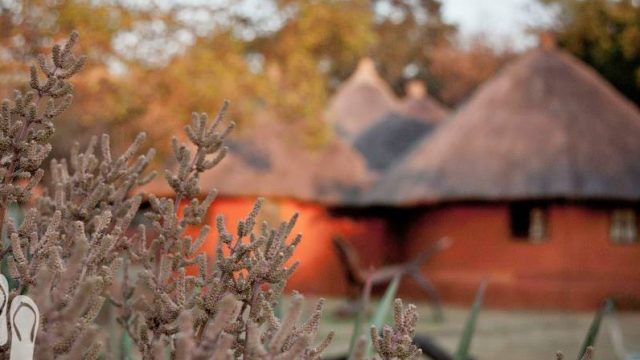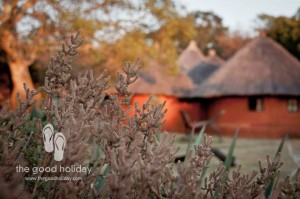“Did we just drive up the Soutpansberg mountain?” Clara is white in the face. I step out into the Limpopo heat, somewhat confused. One would imagine the top of a mountain to have a rocky ridge, not a plateau with its own mini-mountains and grassy plains towering 4,400 feet over the rest of Venda.
From about 50 km back, the range doesn’t really look all that steep, but halfway up I could not help but wonder how even a vehicle with high ground clearance would make it.
“I’m not sure. I think we may have found the world above the world…”
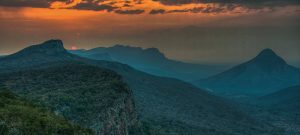
Leshiba Wilderness (courtesy of Leshiba.co.za)
Around me stretches one of the South Africa’s most unique environments – 90,000 hectares of unspoilt wilderness that comprises part of the Western Soutpansberg Conservancy. Just visible through the trees above this scene, sculptures of a man and woman stare back at me. “I’ve just climbed above the clouds to reach you!” I feel like saying, but they pose silently, guarding a village of rondavels (round huts), built using traditional techniques.
This is what I have come for: the infamous Venda Village Lodge – a traditional African village transformed from a run-down settlement to a world class lodge by internationally acclaimed Venda sculptor Noria Mabasa. Leshiba is about the nature, for sure, but also about the unique Venda art. It is one of the largest and most renowned African sculpture sites in the world. The sculpted walls, seating areas, figures and entrances believed to encapsulate the very mystical spirit of Venda.
Darell Lourens/The Good Holiday
The people of Venda are believed to have travelled from the Great Lakes of Central Africa in the 12th Century. Today, the region forms part of South Africa’s Limpopo Province. During the Apartheid era, Venda was a Bantustan or ‘black homeland’. It is now a Natural Heritage Site and many regard it as ‘the last real Africa’. Its sheer magic and traditional superstitions make for a unique, authentic and holistic African experience.
“Welcome” says a voice behind us, “I’m Joyce. I’ll be looking after you for the next few days.” She leads us to the five en-suite African style huts, linked together with mud brick walls and arranged around a central courtyard, where traditional families would have congregated. Sculpted into the walls are faces, benches and pots in shapely female forms. Toward the back of the cluster of huts is a huge lemon tree with a cat curled up beneath it.
“You’ll sleep here,” says Joyce, ushering me into one of the huts. I step inside where coolness immediately soothes the outside heat. “The shower has solar hot water and I’ll bring you a lantern at night. Don’t leave your door open in the day. The room will stay cooler and snakes won’t be able to come in.
Joyce walks out into the heat again and I follow her to an adjacent building, where a lounge with an outdoor fireplace and dining area looks onto a pool deck and a view over the Duluni Valley. “I prepare most of the meals myself. You can eat whenever you want. Just let me know in time. If you want to have a bath there is a separate building. I will take you there.”
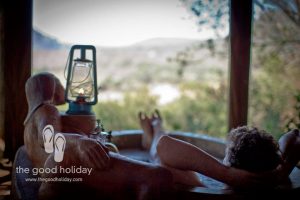
Darell Lourens/The Good Holiday
I’m not entirely sure what I expected, but let me tell you, when they call it the ‘most delicious bath in Africa’, they aren’t far off. I probably spent most of my time languishing in that bath and being pampered by spa treatment specialists in the opposite hut.
We are here in search of my ultimate retreat, and we have found it. The combination of somewhere in the middle of absolutely nowhere, zero cell reception, views that go on forever, accommodation from days gone by, an infinity pool, a gigantic bathtub, spa facilities, privacy, safety, and an on-site chef. The idea of living ‘off-grid’ left me even more inspired. I feel lighter and gentler when I live more simply.
My days at Leshiba were filled with experiences that enriched me, as I was not only pampered and served, but given the opportunity to learn that in a world where authenticity is fast becoming a rare commodity, Leshiba offers that in addition to real luxury.
Practical information
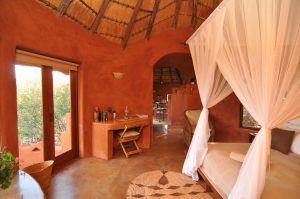
Duvha Luxury Suite (Courtesy of Leshiba Wilderness)
Other accommodation options: For a more private and romantic option, Mwedzi and Duvha Luxury Suites, with private plunge pools and patios overlooking the plateau. The suites have fully-equipped kitchens and lounges, so you can opt for a fully catered or self-catering experience.
Hamasha Bush Camp offers self-catering options for those on a tighter budget. All rooms have an outdoor shower and the central fire pit is splendid for storytelling around night fires.
Luvhondo Camp is Leshiba’s self-catering group accommodation venue, sleeping 46 persons. It is situated close to the cliffs with endless views and is ideal for workshops and small conferences.
Activities:
- Guided Walks to ancient rock art sites
- Guided game drives and walks
- Horse riding (for experienced riders and subject to the availability of a guide)
- Full in-house spa-facilities
- surrounding area
- Leshiba Wilderness is actively involved in promoting local Venda arts and crafts, and you can visit an excellent gallery at the nearby Madi a Thavha Mountain Farm.
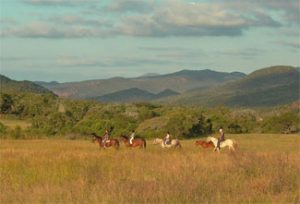
Courtesy of Leshiba.co.za
Logistics: Wireless internet is available if you want to stay connected, but the lodge has only limited cell phone reception.
Leshiba is solar powered. Their borehole water is good for drinking.
The area is malaria-free.
How to get there: From Louis Trichardt, take the R522 to Vivo. Proceed for 35 km and turn right at the Leshiba Wilderness signpost. From here it is a further 10 km into the reserve.
The last 3 km to Leshiba is not suitable for vehicles with a limited ground clearance. Alternative arrangements can be made to collect guests at an additional cost.
What to pack: Comfortable walking shoes or boots, sunscreen, hat, binoculars, camera and insect repellent.
Cost: Prices range from ZAR 1600 sharing (US$97) to ZAR 1920 single ($116) per night. Rates include accommodation, early morning tea/coffee, brunch, afternoon tea, and dinner, one game activity per day (either guided walk or game drive). Rates exclude all beverages, mountain transfer and gratuities.
